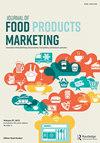Explaining the Market Acceptance of Artificial Sweeteners in a Developing Country: Evidence from Female Young Adults in Zimbabwe
IF 2.4
Q2 BUSINESS
引用次数: 2
Abstract
ABSTRACT This paper examines whether a proposed set of factors explains consumers’ acceptance of artificial food sweeteners in a selected developing country. A quantitative cross-sectional survey was conducted on 938 female respondents aged between 18 and 24 who resided in the three largest cities in Zimbabwe (i.e., Harare, Bulawayo, and Gweru). Data collected in 2019 and 2020 were analyzed using partial least squares structural equation modeling. The ‘health consciousness’ and ‘preference for natural products’ variables had a significant negative predictive influence on the ‘acceptance of artificial sweeteners’ variable. However, ‘trust in regulators’ had a positive effect on the same outcome variable. Moreover, the ‘negative attitude toward sugars’ variable significantly moderated the relationship between ‘preference for natural products’ and ‘acceptance of artificial sweeteners.’ These findings have fundamental practical implications related to the marketing of food innovations in Zimbabwe where deceptive marketing strategies continue to threaten consumers’ welfare and affect their receptiveness to new products.解释人工甜味剂在发展中国家的市场接受度:来自津巴布韦年轻女性的证据
摘要本文考察了一组拟议的因素是否可以解释一个选定的发展中国家消费者对人造食品甜味剂的接受程度。对居住在津巴布韦三大城市(即哈拉雷、布拉瓦约和瓜鲁)的938名年龄在18至24岁之间的女性受访者进行了一项定量横断面调查。使用偏最小二乘结构方程建模对2019年和2020年收集的数据进行了分析。“健康意识”和“对天然产品的偏好”变量对“接受人造甜味剂”变量有显著的负面预测影响。然而,“对监管机构的信任”对同样的结果变量产生了积极影响。此外,“对糖的负面态度”变量显著调节了“对天然产品的偏好”和“对人造甜味剂的接受度”之间的关系这些发现对津巴布韦的食品创新营销具有根本的实际意义,在津巴布韦,欺骗性的营销策略继续威胁消费者的福利,影响他们对新产品的接受度。
本文章由计算机程序翻译,如有差异,请以英文原文为准。
求助全文
约1分钟内获得全文
求助全文
来源期刊

Journal of Food Products Marketing
BUSINESS-
CiteScore
5.70
自引率
6.90%
发文量
17
期刊介绍:
From food promotion and advertising through new food product development and consumer behavior research, the Journal of Food Products Marketing provides timely, practical articles that keep food marketers on the cutting edge of their profession. The journal includes refereed research studies as well as opinions, guidelines, and speeches by practitioners that contribute to the better practice and understanding of food marketing. The journal provides a single forum for both food marketing academicians and food marketing practitioners.
 求助内容:
求助内容: 应助结果提醒方式:
应助结果提醒方式:


